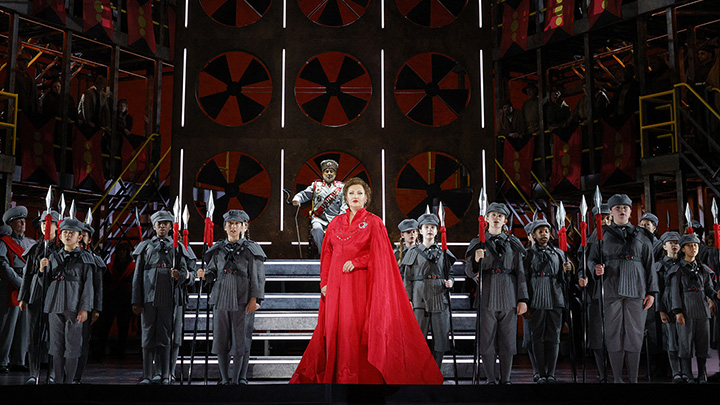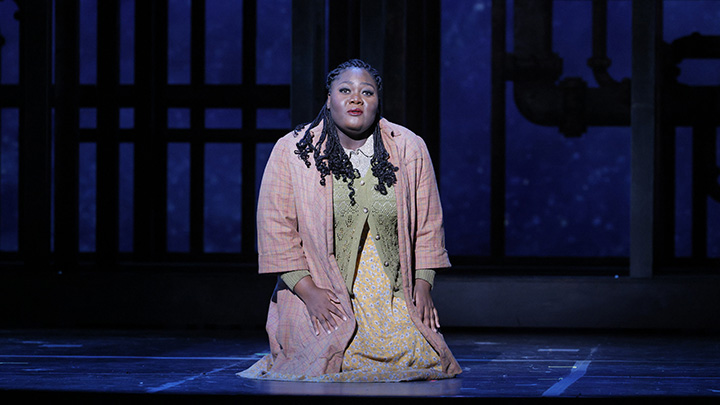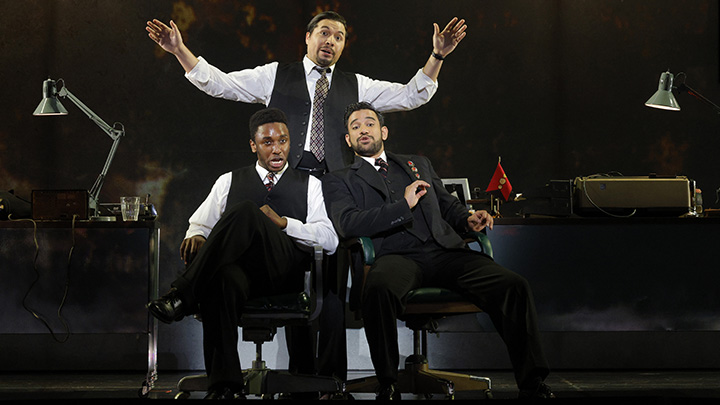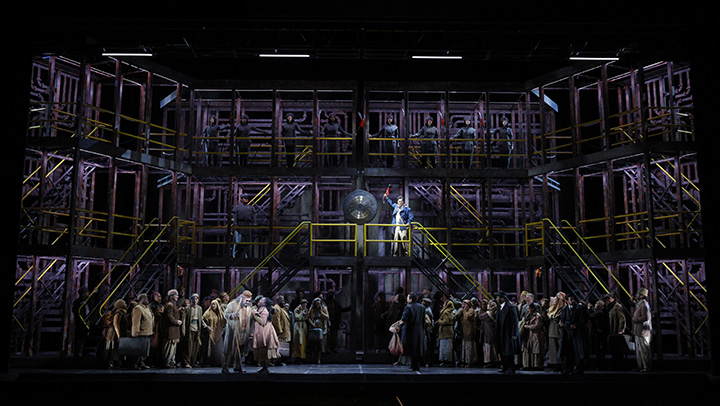After an uneven record this past year—deeply misguided Met co-production Grounded, a serviceable Romeo et Juliette, and marginal Offenbach remix Songbird—this was a reminder of the kind of well-cast and thoughtful production of the standard rep the company is capable of.
Polish soprano Ewa Plonka’s appearances in the U.S. have been limited so far (most recently a Dallas Tosca) but she has become a steady presence on major European stages in the heavy Verdi and Puccini repertoire, with her Turandot appearing in Berlin and Madrid and coming next year to Covent Garden. Her pure, focused soprano is most at home in the role’s stratospheric confines, offering perhaps a lighter timbre than usually heard in this role, with minimal dramatic coloring.
Yet the voice has a tremendous cutting power that focuses your attention and thrillingly pops through the most punishing full orchestra and chorus onslaught like the Act II finale. Her sound seemed less interesting in the occasional foray down the staff, but that is not much of a distraction in Turandot. Her take on the princess in Act II was confident and worldly, in line with the updated staging, and almost diabolical in the riddle scene, a middle-kingdom Ortrud.
Calaf was sung by the American tenor Jonathan Burton at this performance, standing in for an indisposed Yonghoon Lee. Burton brought a pleasing warmth and musicality to the role, his voice blooming into a satisfying top able to bring off the part’s signature moments. Yet it lacked that passionate edge that usually allows tenors to cut through the work’s substantial forces and was sometimes at the mercy of the orchestra. Dramatically, Burton was largely limited to off-the-shelf tenor gesturing, though he revealed some deeper insights in Calaf’s expanded material in the new ending.
The most memorable singing of the evening was reserved for Masabane Cecilia Rangwanasha’s Liu. Winner of the Cardiff song prize and an overall finalist in 2021, Liu is one of her few staged roles as Rangwanasha spends much of her time concertizing. Her smoky soprano was a beautiful fit for this music, reserved and poignant in a controlled reading of “Signore, Ascolta!” with delicate, chill-inducing high notes. “Tu, che di gel sei cinta” in Act III was likewise devastating, the opening seeming to unfold in one long unbroken phrase.
Highlights of a strong supporting cast included veteran Neil Shicoff’s thoughtful Emperor, bass Peixin Chen’s affecting Timur, and an imposing opening to the evening from bass-baritone Le Bu’s Mandarin. The trio of advisors (Ehan Vincent, Sahel Salam, and Jonathan Pierce Rhodes), thankfully renamed in this production, made much of the opening of Act II especially in the wistful bureaucrats’ daydream section, though some coordination problems with the pit marred their Act I interjections.
Maestro Speranza Scapucci led a strong performance in the pit, setting an urgent, relentless pace in the extended Act I orchestra and chorus sequence and nicely highlighting inventive details in Puccini’s score with excellent support from the band’s winds and brass. The Washington National Opera chorus turned in a vital reading of Puccini’s extensive choral material, with some standout work by the tenor section in exposed passages.
Zambello’s update puts the action in a 20th century regime loosely inspired by communist China (nevermind the princess). It’s an effective choice, quickly telegraphing the degree to which Turandot’s kingdom has been degraded by constant violence, a point that is harder to make with glittery papier-mâché dragon heads everywhere. Factory-like catwalk structures dominate the stage (set design by Wilson Chin) while the throne room is set against a backdrop of large industrial fans. Costumes (by Linda Cho) place the kingdom’s wretched as displaced peoples and mark the militaristic nature of the elite in this society. Uniform-clad women from the Washington National Opera Corps Dancers, perhaps on loan from Act II of Nixon in China, added visual interest to the transitions in choreography by Jessica Lang and Kanji Segawa.
Now about that ending. The collaborators’ take on the typically heard “Alfano II” ending is that 1) Turandot’s change of heart is not rooted in a sufficiently developed sense of her character and 2) Calaf’s forced kiss as the trigger of that change is an offensive trope and not believable. To address these issues, Turandot gets a lot more to say after “Principessa di Morte,” providing more back story about sexual violence that she suffered herself and emphasizing how her ruthlessness has grown out of concerns for her kingdom. In lieu of the kiss, Calaf spends time making his case to the princess that mercy is a better policy than constant executions.
Musically, Tin incorporates the same fragments Puccini left at his death, though often in novel ways—for instance, the tune for “Mio Fiore,” usually Calaf’s insistent love song, becomes a part of Turandot’s memory of her assault. The neo-romantic mode of Tin’s orchestration feels broadly continuous with the main score, though Tin adds some interesting details from traditional Chinese music and instrumentation. The seams are more visible in the vocal writing, which becomes decidedly fussier and less direct in the new material.
On paper, this is certainly a more thorough justification for the happy ending than we get usually get, but the dramatic payoff feels no less abrupt and unearned, if by different means. Turandot’s additional exposition is thoughtfully revealed in the moment, but can’t help but feel like a bit of ungainly fanfic appended at the 11th hour. Moreover, watching Calaf assume the role of life coach guiding Turandot to better decisions comes is perhaps too sympathetic a turn and rankles after all of his terrible, myopic behavior.
Once Turandot turns the corner, the usual ending at least gets to the curtain quickly before the audience has too much time to nitpick the outcome. Tin and Stanton’s completion seems to put a happy bow on every loose end, including some belated justice for Liu. Some of Tin’s original themes, introduced as we shift into the happy ending, exacerbate that disconnect, with a cloying modern affect that too neatly wipes away all the night and horror we’ve just witnessed.
As a quarter hour of music taken on its own terms there are moments to enjoy here, but this does not feel like a significantly more successful “solution” to the ending. Indeed, it may be further from that goal than the Alfano, as the glorious conclusion is easier to buy under a continuation of the libretto’s fairy-tale adjacent logic than reliance on Calaf’s powers of persuasion alone. These are not very nice characters (characters in a fairy tale often aren’t) but the new libretto seems to want us to better understand their actions and like them more, a tall order with such limited real estate.
Or perhaps Alfano’s detractors should agree that the happy ending can never really satisfy, abandon the original material and give us something in a tragic vein: Calaf’s reckless horniness finally catches up to him as Turandot reveals that she has tricked him into revealing his name, cackling manically upstage as he is led away to the chopping block to a minor-key “Nessun Dorma” reprise. Curtain.
Photos: Cory Weaver






